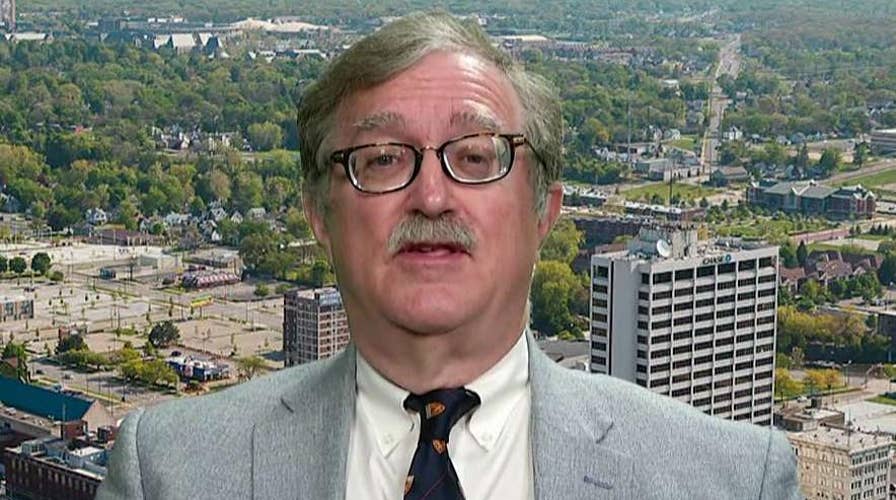Historian wants to reclaim history from the left's portrait of America
Dr. Wilfred McClay, author of the new book 'Land of Hope,' says the promise of America is still alive and real.
There is a strong tendency in modern American society to treat patriotism as a dangerous sentiment, a passion to be guarded against. But this is a serious misconception. To begin with, we should acknowledge that there is something natural about patriotism, as an expression of love for what is one’s own, gratitude for what one has been given, and reverence for the sources of one’s being.
These responses are instinctive; they’re grounded in our natures and the basic facts of our birth. Yet their power is no less for that, and they are denied only at great cost.
Another one of the deepest needs of the human soul is a sense of membership, of joy in what we have and hold in common with others. Much of the time, though, the way we Americans talk about ourselves takes us in the opposite direction.
PATRIOTIC PATROL-CAR LETTERING SPARKS BACKLASH IN CALIFORNIA CITY
We like to think of the individual person as something that exists prior to all social relations, capable of standing free and alone, able to choose the terms on which he or she makes common cause with others. Even our own battered but still-magnificent Constitution, with its systemic distrust of all concentration of power, assumes that we are fundamentally self-interested creatures. This does capture some part of the truth about us. But only a part.
For among our deepest longings is the desire to belong, and it is an illusion to believe that we can sustain a stable identity in isolation, living apart from the eyes and ears and words of others. Our nation’s particular triumphs, sacrifices, and sufferings — and our memories of those things — draw and hold us together, precisely because they are the sacrifices and sufferings, not of all humanity, but of us alone. In this view, there is no more profoundly American place than Arlington National Cemetery or the Civil War battlegrounds of Antietam and Shiloh.
America can be hard to see. So there is a vital tension in the makeup of American patriotism, a tension between its universalizing ideals and its particularizing sentiments, with their emphasis upon memory, history, tradition, culture, and the land.
This quality of particularity is, in its own way, a different kind of universal. It is simply the way we are. It is part of the human condition and is something that we share with the peoples of nearly all other nations. It is universal precisely because it is not universalistic, just as the love of one’s own parents or one’s family or one’s spouse is universal precisely in its particularity. All parents love their children, but my parental love and obligations are directed at my own. And that is as it should be.
All enduring civic affections must be built from the inside out. Something similar holds true for countries and for patriotism, even American patriotism. Yet this aspect of American patriotism is not always well articulated, particularly in academic settings. One will have better luck finding it in popular culture, in songs and fictions where one can find the more primal aspects of American patriotism expressed with great directness and vividness.
America can be hard to see. So there is a vital tension in the makeup of American patriotism, a tension between its universalizing ideals and its particularizing sentiments, with their emphasis upon memory, history, tradition, culture, and the land.
The genius of American patriotism permits both to coexist, and even to be harmonized to a considerable extent, therefore making them both available to be drawn upon in the rich, but mixed, phenomenon of American patriotism. It would be a mistake to insist on one while excluding the other. They both are always in conversation with one another, and they need to be. And that conversation, to be a real and honest one, must include the good, the bad, and the ugly, the ways we have failed and fallen short, not merely what is pleasing to our national self-esteem.
But by the same token, the great story, the thread that we share, should not be lost in a blizzard of details or a hailstorm of rebukes. This is, and remains, a land of hope, a land to which much of the rest of the world longs to come.
The mixed patriotism that the United States has brought into being is one of the bright lights of human history, and we should not allow it to be extinguished, either through inattention to our ideals or through ignorance of our story.
CLICK HERE TO GET THE FOX NEWS APP
So we have a responsibility before us. We must know both, not only our creed but also our culture. We need to take aboard fully all that was entailed in our forebears’ bold assertion that all human beings are created equal in the eyes of the Creator and that they bear an inherent dignity that cannot be taken away from them.
But we also need to remember, and teach others to remember, the meaning of Lexington and Concord, and Independence Hall, and Gettysburg, and Promontory Summit, and Pointe du Hoc, and Birmingham, and West Berlin, and countless other places and moments of spirit and sacrifice in the American past — places and moments with which the American future will need to be conversant and will need to keep faith.









































